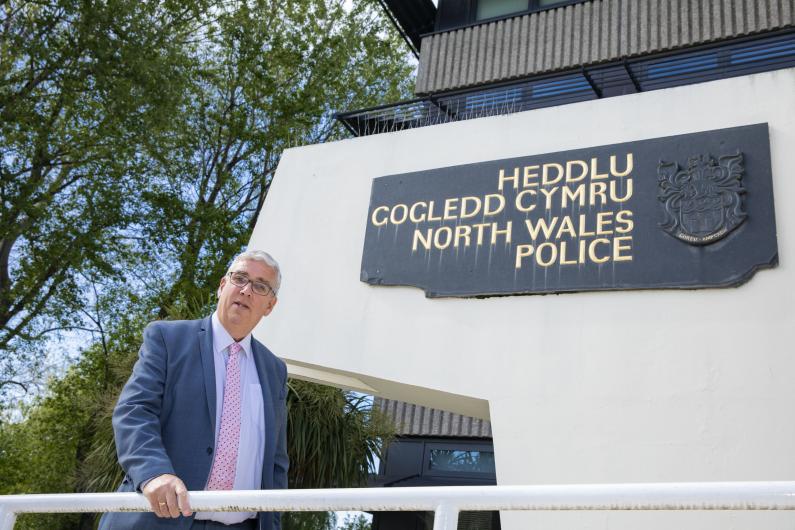Date

A police boss is writing to the Prime Minister calling for urgent reforms after alarming new figures showed drugs deaths have reached record levels – with fatalities increasing more quickly in Wales than the rest of the UK.
North Wales Police and Crime Commissioner Arfon Jones said it was a “national scandal” that people were dying needlessly because successive governments had refused to acknowledge that a radical new approach was needed.
According to the Office of National Statistics, most deaths were due to opiates such as heroin, but cocaine deaths doubled in three years and MDMA deaths were also at their highest ever level.
They revealed that a total of 4,359 in the UK dried due to drug poisoning last year – which was a 16 per cent increase on the figure for 2017.
Deaths from new psychoactive substances - known as "legal highs" until they were banned in 2016 - doubled in a year to 125. MDMA deaths rose from 56 to 92.
In Wales there were 327 drug poising deaths in 2018 which was a 26 per cent increase on the previous year.
Half of the deaths in Wales were caused by opiates and 65 per cent of those who died were men.
Between 2016 and 2018 in North Wales, 98 people died as a result of drug misuse – with the highest number of fatalities in Gwynedd, closely followed by Flintshire.
The rate of drug deaths in the UK was now, said Mr Jones, more than double the European average, and 12 times that of Portugal which decriminalised drug possession in 2001.
Mr Jones, a former police inspector, said: “The so-called war against drugs has failed for 30 years and is doomed to continue failing.
We need a new pragmatic, common sense approach that treats problematic drug use as a medical issue and not a criminal matter.
I am going to be writing to Boris Johnson asking him to look again at the UK’s antiquated drugs laws as a matter of urgency.
He should follow the evidence and look at what happened in countries like Portugal where drugs were decriminalised.
As a result, there were dramatic drops in problematic drug used, HIV and hepatitis infection rates and deaths caused by drugs overdoses.
Another bonus was that drug-related crime decreased. If you take out the criminality, you also take out the organised crime gangs.”
I would like to see a pilot scheme set up in North Wales to give prescribed heroin to people with problematic drugs use, similar to one that is being set up in Cleveland in the Autumn.There, Medical-grade heroin – diamorphine – will be given to them at special centres where they can inject themselves twice a day, seven days a week.
It has been estimated the scheme will cost about £12,000 a year for each addict, which is a fraction of the cost of the crime they commit.
I believe a pilot in North Wales should be funded by the Area Planning Board, which together with the Health Board, has an annual budget of £10 million a year to spend on schemes aimed at combating substance abuse, including alcohol.”
Mr Jones is already in the process of establishing a pioneering project to divert “low level” offenders away from a life of crime and keep them on the straight and narrow.
The Checkpoint Cymru programme will be launched in October in a bid to cut crime and reduce reoffending rates.
According to Mr Jones, a former police inspector, it will also free up more police and court time.
The concept was developed by Cambridge University and it’s already up and running in Durham where it’s proved highly effective.
Although the figures in Durham still need to be formally evaluated, they show a big reduction in reoffending rates, from 30 per cent down to 18 per cent, with only five per cent of those taking part failing to complete the programme.
At the same time, Mr Jones will also be introducing another initiative based on a different pilot project, the Bristol Drugs Programme, which has been equally successful.
People caught with small amounts of drugs will be steered towards educational awareness courses similar in principle to the ones for drivers caught speeding and those who take part can avoid a criminal conviction.
The commissioner said: “Evidence has shown that a high proportion of offenders have underlying issues such as substance misuse, mental health, financial or housing problems which have their origins in traumatic experiences.
By addressing the underlying causes of their offending behaviour those signing up to the programme are less likely to reoffend as has been clearly demonstrated in Durham.”
Many of the people who fall foul of the law are victims themselves and a lot of them will have more than one issue so it's taking a holistic approach to a person's situation and conducting a needs assessment so they can get appropriate support to overcome their problems.”